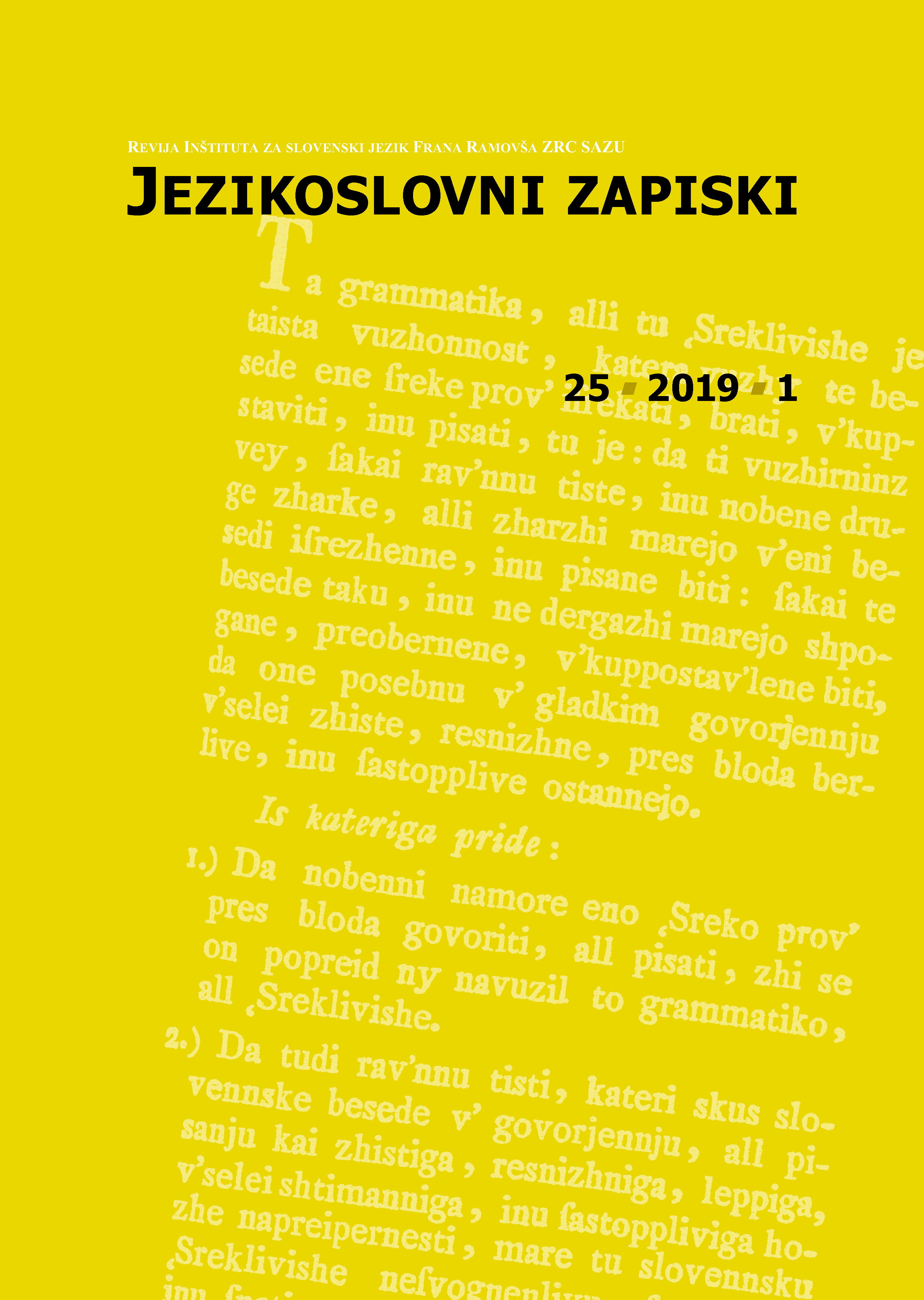The Problem of Iota in Ancient Greek ikhthỹs ‘fish’
DOI:
https://doi.org/10.3986/jz.v25i1.7568Keywords:
ikhthỹs, Ancient Greek, Proto-Indo-European, historical phonology, anaptyxis, schwa secundum, thorn clustersAbstract
This article focuses on the problem of word-initial iota in Ancient Greek ikhthỹs ‘fish’, which has not yet received a wholly satisfactory explanation. It is suggested that it can be explained as a consequence of the word’s hysterokinetic paradigm inherited from Proto-Indo-European, whose structure incurred an anaptyxis of schwa secundum, and the metathesis of the thorn cluster in the oblique stem in Proto-Greek, which only magnified the allomorphy, leading to subsequent analogical paradigmatic levelling. Two possible scenarios of how these processes could have progressed and culminated in the attested Ancient Greek word form are critically presented and evaluated.Downloads
References
Beekes 2010 = Robert Stephen Paul Beekes, Etymological Dictionary of Greek 1–2, sod. Lucien van Beek, Leiden: Brill, 2010.
Byrd 2015 = Andrew Miles Byrd, The Indo-European Syllable, Leiden: Brill, 2015.
Chantraine 1999 = Pierre Chantraine, Dictionnaire étymologique de la langue grecque: histoire des mots: avec un Supplément, Paris: Klincksieck, 21999 (11968).
Derksen 2015 = Rick Derksen, Etymological Dictionary of the Baltic Inherited Lexicon, Leiden – Boston: Brill, 2015.
Frisk 1960–1972 = Hjalmar Frisk, Griechisches etymologisches Wörterbuch 1–3, Heidelberg: C. Winter, 1960–1972.
Goldstein 2014 = David Goldstein, Phonotactics, v: Encyclopedia of Ancient Greek Language and Linguistics 3: P–Z, Index, ur. Georgios K. Giannakis, Leiden: Brill, 2014, 96–97.
Kloekhorst 2016 = Alwin Kloekhorst, Proto-Indo-European “thorn”-clusters, Historische Sprachforschung 127 (2016), 43–67.
Kümmel 2012 = Martin Joachim Kümmel, Typology and reconstruction: the consonants and vowels of Proto-Indo-European, v: The Sound of Indo-European: Phonetics, Phonemics, and Morphophonemics, ur. Benedicte Nielsen Whitehead idr., Copenhagen: Museum Tusculanum Press, 2012, 291–329.
Lejeune 1987 = Michel Lejeune, Phonétique historique du mycénien et du grec ancien, Paris: Klincksieck, 1987.
Lipp 2009 = Reiner Lipp, Die indogermanischen und einzelsprachlichen Palatale im Indoiranischen II: Thorn-Problem, indoiranische Laryngalvokalisation, Heidelberg: C. Winter, 2009.
LSJ = Henry George Liddell – Robert Scott – Henry Jones – Roderick McKenzie, A Greek-English Lexicon, Oxford: Clarendon Press, 91961 (91940, 11843).
Martirosyan 2009 = Hrach K. Martirosyan, Etymological Dictionary of the Armenian Inherited Lexicon, Leiden: Brill, 2009.
Mayrhofer 1986 = Manfred Mayrhofer – Warren Cowgill, Indogermanische Grammatik I, Heidelberg: Carl Winter Universitätsverlag, 1986.
Meier-Brügger 2003 = Michael Meier-Brügger, Indo-European Linguistics, Berlin – New York: Walter de Gruyter, 2003 (nemški izvirnik: 82002).
Rau 2010 = Jeremy Rau, Greek and Proto-Indo-European, v: A Companion to the Ancient Greek Language, ur. Egbert Jan Bakker, Chichester – Malden: Wiley-Blackwell, 2010, 171–188.
Rix 1992 = Helmut Rix, Historische Grammatik des Griechischen: Laut- und Formenlehre, Darmstadt: Wissenschaftliche Buchgesellschaft, 21992 (11976).
Schindler 1977 = Jochem Schindler, A thorny problem, Die Sprache 23 (1977), 25–35.
Schwyzer 1939 = Eduard Schwyzer, Griechische Grammatik: auf der Grundlage von Karl Brugmanns griechischer Grammatik 1, München: C. H. Beck’sche Verlagsbuchhandlung, 1939
Sihler 1995 = Andrew Littleton Sihler, New Comparative Greek and Latin Grammar, New York – Oxford: Oxford University Press, 1995.
Smoczyński 2007 = Wojciech Smoczyński, Słownik etymologiczny języka litewskiego = Lietuvių kalbos etimologinis žodynas, Wilno = Vilnius: Uniwersytet Wileński, Wydział Filologiczny = Vilniaus universitetas, Filologijos fakultetas, 2007
Šorgo 2017 = Aljoša Šorgo, Uvod v frigijščino, 2017. – Izroček.
Vine 1999 = Brent Vine, Greek ῥίζα ‘root’ and “schwa secundum”, v: UCLA Indo-European Studies 1, ur. Vyacheslav V. Ivanov – Brent Vine, Los Angeles: UCLA Program in Indo-European Studies, 1999, 5–30.
Downloads
How to Cite
Issue
Section
License
Authors guarantee that the work is their own original creation and does not infringe any statutory or common-law copyright or any proprietary right of any third party. In case of claims by third parties, authors commit their self to defend the interests of the publisher, and shall cover any potential costs.
More in: Submission chapter





